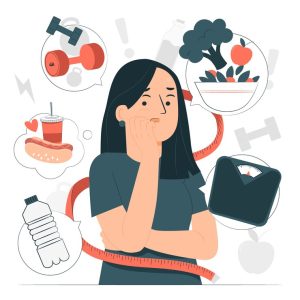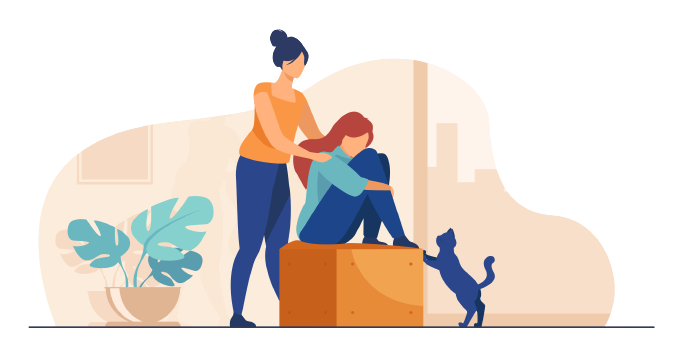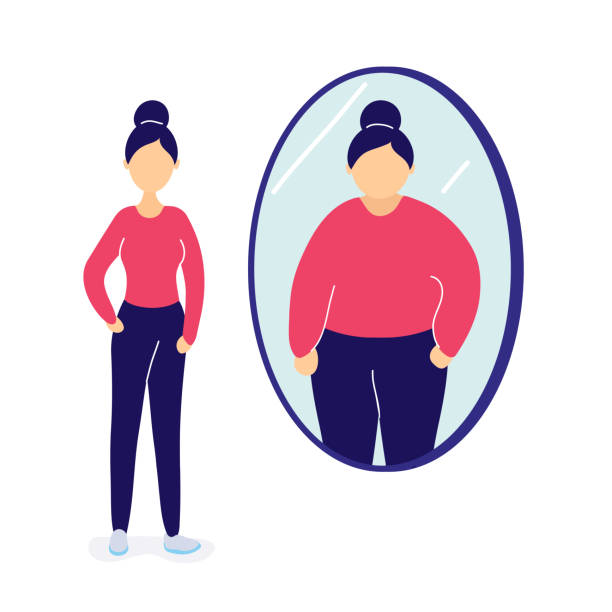
The world often sees eating disorders as just a food and weight issue. But for you, the one struggling, it’s likely way more complex. When you delve deeper into the interplay between food and your self-perception, there is an intricate web of causes of eating disorders.
Understanding the deeper “whys” behind your struggles can be a powerful tool in your journey towards recovery. In this article, we will uncover the psychological defenses and factors that may be contributing to eating disorders.
What Is An Eating Disorder?

Eating disorders aren’t about the food itself, but about a complex relationship with it and your body. It’s deeper than just counting calories – it’s about intense guilt and shame over having a small treat. While the types of eating disorders differ, one common thread is the overwhelming focus on food and body image. Understanding how this pattern developed is the first step towards recovery and a healthier relationship with yourself.
The Hidden Causes of Eating Disorders
We all have patterns in our lives, some helpful, some not so much. But why do we stick to these unhelpful patterns? Below are a few reasons why eating disorders emerge. Remember, there is no one single reason that can cause an eating disorder. Eating disorders can be caused due to a complex interplay between nature, nurture, and how the mind works.
However, learning about the often ignored aspects of eating disorders can aid in your journey towards recovery.
1. Viewing Food As A Reward
You might find yourself reaching for food after a long, draining day at work, a heavy meal offering a sense of comfort and reward. It’s like a promise you make to yourself: “Get through this, and you can have a treat.” Food becomes a bargaining chip, a way to motivate yourself and feel appreciated in the face of challenges.
However, if you are struggling with a pattern of disordered eating, this tendency can backfire. Slowly, every difficult situation becomes a reason to indulge and overeat, resulting in eating disorders like bulimia and binge eating. The temporary comfort from that heavy meal can’t truly address the underlying stress or exhaustion. In fact, it might even leave you feeling worse, trapped in a cycle of emotional eating and self-blame.
2. Using Food To Gain A False Sense of Control
Life throws curveballs, and sometimes, it feels easier to control something, anything. Food can become that source of control, especially during stressful times like moving to a new city or being in a new job. The unfamiliar can be overwhelming, and the routine of restricting food can feel like a way to manage the chaos. But like trying to control the weather, this sense of control is ultimately an illusion. Avoiding new experiences and clinging to rigid eating patterns, however comforting in the short term, can contribute to eating disorders like anorexia, where anxiety manifests as a need for extreme control.
Often control is a pattern formed by past traumas. If you have experiences of feeling completely out of control or helpless as a child, or even traumatized, abandoned, or abused, you may develop unhealthy control patterns, trying to manage and control everything in your surroundings.
Such control can also get manifested as control of food, and can lead to anorexia- like tendencies where you control and develop perfectionism around food to the extent that it occupies a great deal of your mind space and leaves you with little energy to focus on other things in your life.
3. Using Food To Detach and Dissociate
Ancient Buddhist wisdom tells the unhelpful patterns we indulge in, like eating disorders for example, are often a way to avoid pain and suffering. We might turn to food for comfort, seeking a temporary escape from overwhelming emotions like loneliness, sadness, or fear.
For example, imagine going through a tough breakup. You’re dealing with a wave of emotions that feel impossible to handle – the heartache, the emptiness. In that moment, a tub of decadent chocolate ice-cream might seem like the perfect solution, numbing the pain, one scoop at a time.
On the other end, becoming “food-focused” as seen in anorexia- that is, being focused on what goes in and measuring everything, becomes a way of not sitting with the difficult stuff in your life. Thus, food can be a way to avoid or detach, either by using it to numb yourself by indulging, or by being too focused on food to avoid feeling your emotions.
While enjoying food with friends or indulging occasionally is totally okay, using it to constantly numb emotional pain can become counterproductive. It might feel like you’re moving on, but those difficult emotions are still there, buried beneath the surface. Over time, this pattern of ignoring your feelings can be one of the reasons that contribute to an eating disorder.
4. Using Food To Attain Perfectionism
Our society and social media bombards us with distorted images and unrealistic expectations, making it easy to feel inadequate and fall prey to the trap of perfectionism. Individuals struggling with eating disorders may base their self-worth solely on their appearance. The eating disorder then becomes a relentless pursuit of an unattainable ideal, offering a temporary sense of validation and achievement. However, in the long run, this pursuit distorts and negatively affects your body image.
5. Becoming The Harshest Critic You Know
Imagine looking in the mirror and hearing that critical voice calling you names. It might then turn its attention to your body, fueling negative self-perception. This relentless negativity could be your inner critic trying to shield you from potential hurt by others. The logic might be: “If I hurt myself first, others’ words won’t have the same power to wound me.” This self-inflicted pain, through binging or restricting food, then becomes a twisted form of self-protection.
6. Using Food To Punish Yourself
In eating disorders, food transforms from a source of nourishment into a tool for self-inflicted punishment. Imagine feeling overwhelmed by stress or a perceived failure, and instead of reaching out to a friend, you restrict yourself to a tiny salad for dinner. The hunger pangs become a constant reminder of your “bad” behavior. Conversely, after a social event where you feel insecure, you might find yourself mindlessly binging on unhealthy snacks. The shame and guilt that follow become a form of self-punishment, creating a vicious cycle where food controls your emotions. It’s like using a metaphorical whip – restriction for “bad” and overindulgence for “worse” – leaving you feeling emotionally and physically drained.
Struggling with body image can fuel your inner critic, leading to a cycle of self-punishment through food and harsh self-criticism. This harshness, while seemingly relentless, might stem from an unexpected place, a misguided attempt at protection.
Seeking counseling for eating disorders can be a great way towards healing the strained relationship with food. It can be an open, compassionate space to shed the layers of shame, and learn to cope with poor body image and disordered eating using healthier coping strategies.
Remember, understanding the “whys” behind your eating disorder is just the first step. By acknowledging the complex interplay between your thoughts, emotions, and relationship with food, you’re taking a powerful step towards healing. Recovery is possible, and with the right support, such as therapy, techniques like mindful eating, you can find peace and develop a more positive self-image free from the grip of an eating disorder.

Are your eating habits holding you back?
Counseling can be a great tool for you to manage and overcome your eating disorders and lead a happy, fulfilling life.
We are here for you.
About the Author
This article was written by Parvathi Ganesan, Counselor at Inner Space. This post was consulted & approved by professional therapists practicing online therapy and counseling.
Ask a Therapist
If you are interested to know more about loneliness and other mental health topics, ‘Ask A Therapist’ is a platform for you to ask your questions related to Mental Health, Mindfulness & Emotional Well-Being to our team of qualified Therapists.




